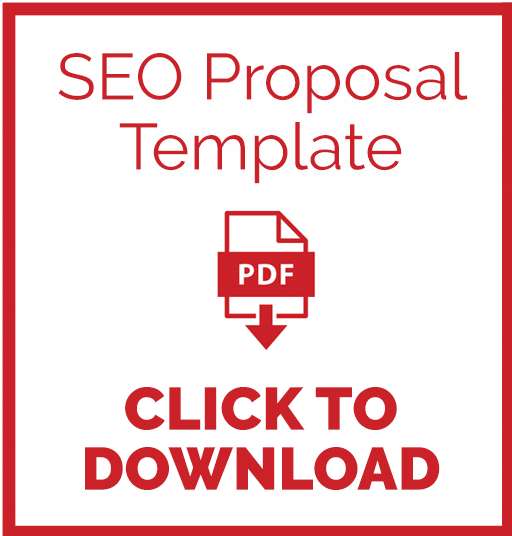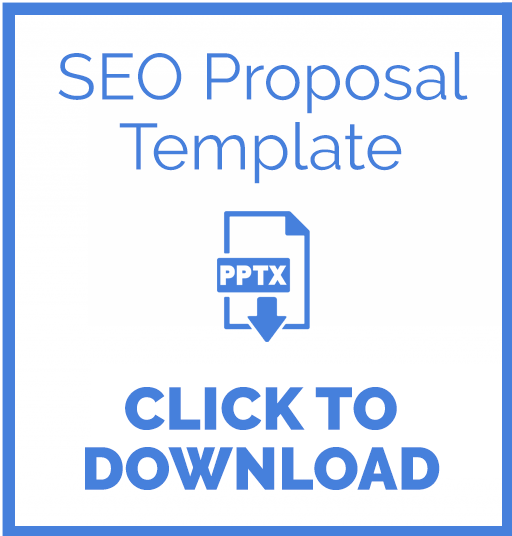
New business should be a core activity carried out by every digital agency. Whether your agency relies on outbound sales tactics, inbound marketing or a mixture of both; an SEO Proposal is fundamental to the process of converting leads to clients.
Our Embeddable Audit Tool plays a pivotal role in enabling digital agencies to scale their new business activities. Through this and agency founder interviews, we've learned exactly which components you should include in your SEO Proposals to help motivate prospects and win more business. We've distilled these learnings into an SEO Proposal Template which you can download below in PDF format. Use this SEO proposal template in conjunction with our guide on how to create SEO Reports for clients.
Prefer Google Slides? Save the SEO Proposal Template Slides to your Drive.
Before we run through an SEO Proposal sample in full, make sure you know the answers to these 3 very important questions from the prospective client:
1. What are their business objectives?
Since we're talking about SEO, their likely objective will be to "increase traffic" but try to dig a bit deeper and understand what's potentially underneath this. As there are several true business objectives that can be extrapolated from "increase traffic", here are just a few:
- Increase revenue
- Increase traffic quality
- Increase conversion rate
- Increase visibility in search results
- Optimize Google My Business listing
- Outrank competitors in search results
2. What are their target search terms?
Simply looking at what the site currently ranks for is not enough. Have a discussion with the prospective client and understand what search terms and phrases they want to rank for.
3. Who are their key competitors?
Not only will this help you provide context around their current search performance, it may also help you in the future by potentially supporting a business case for additional work that helps your prospective client compete more effectively against their competitors.
You could always take an educated guess at answering these questions (and it might be obvious for some businesses) but nothing beats hearing it from the prospective client directly. Schedule a call or better still, a Zoom call so you can discuss these points and hear how they describe their business and their challenges. Take note of what they emphasise and the level of emotive adjectives they use. You'll want to make sure you're 100% clear on these 3 questions before continuing because you'll be reiterating the answers to all of them in the SEO Proposal! This will show you have a solid grasp of their business and that you can build SEO strategies that help them achieve their goals.
Once you've got those answers, download the SEO Proposal sample. The following guide will explain each section of the template:
Section 1: Insights from an SEO Audit
The best SEO Proposals are the ones that provide value upfront. Don't talk about how great your agency is on page 1. Skip writing a cover letter (save that for the actual email). Page 1 of your SEO proposal should be about value exchange. This is what makes your agency stand out and how you can build trust at the very start of a relationship.
Lead with an executive summary showing key insights that identify current SEO problems on their website, what they mean for their rankings and how you'll fix them so rankings improve. Use these insights to identify opportunities and how you'll help the client create differentiation among their competitors in search results.
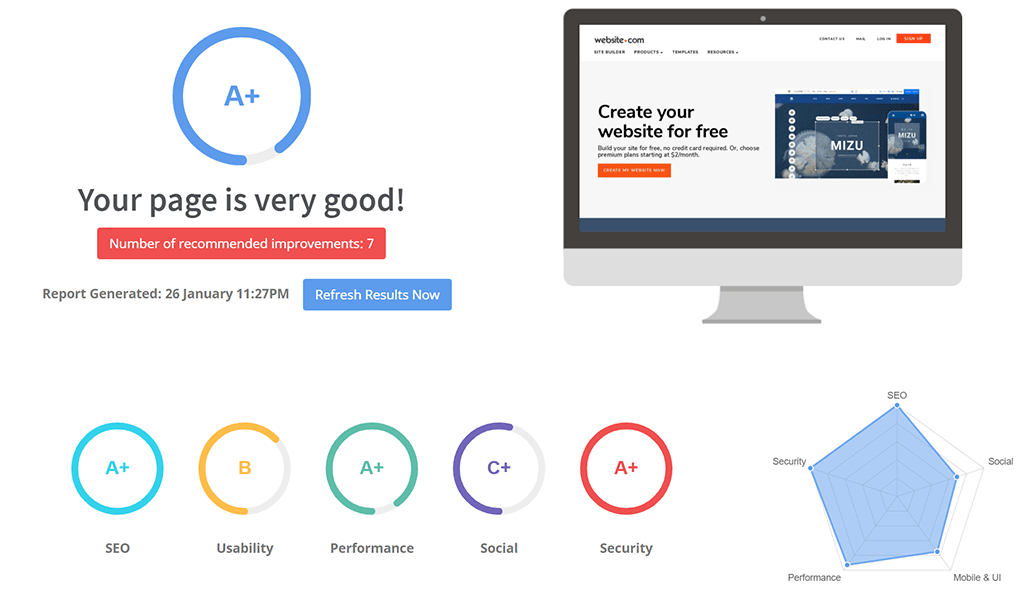
Pro Tip: Reiterate the prospective clients' goals and objectives throughout the proposal
Everything you're suggesting in the SEO Proposal must have a tangible, clear connection to the business objectives they told you at the start. Don't throw in service line items unless each one is rationalized and clearly supports one or multiple business objectives. It may seem obvious to you why certain services are needed but half the job in the SEO proposal is to make them sound absolutely mandatory if they want to achieve their objectives. Underpinning your entire proposal with the client's business objectives shows you that you're invested in their success.
Section 2: SEO Implementation Roadmap
At the start of a client relationship, SEO services may contain multiple concurrent moving parts. Some of these are one-off tasks & fixes while others may become weekly or monthly processes. To best capture the value you'll be delivering across all this work, its best to group individual tasks into separate projects and roadmap them in a timeline view like a calendar or Gantt chart:
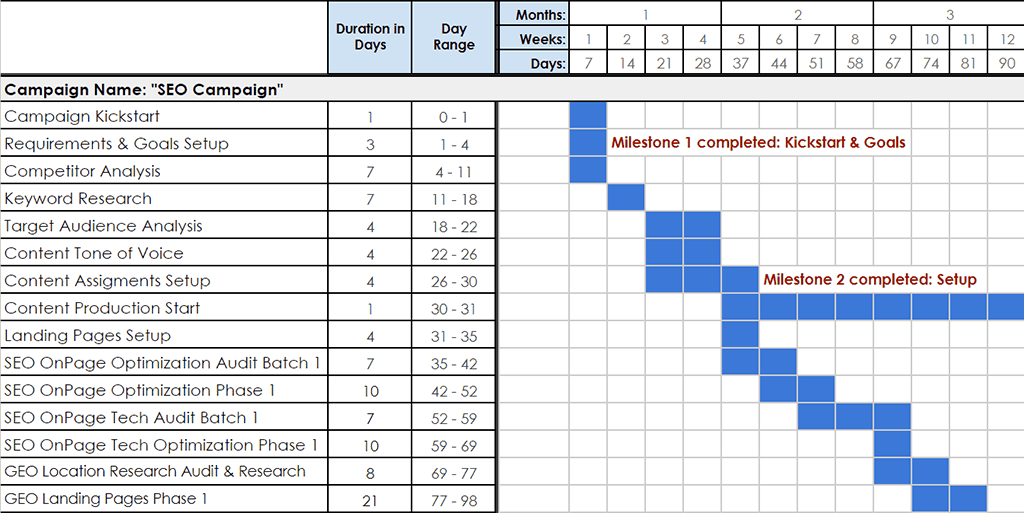
Depending on the client's stage and the amount of work, you could create multiple milestones and price them separately which may help the client budget their spend accordingly.
Pro Tip: try 'downselling' the client initially by carving off a small milestone at a low price (sub $1,000)
This tip may seem counter-intuitive but it can be effective for converting SMEs. If they're willing to embark on a small piece of work with you like a strategy plan or fixing critical SEO issues in a short time frame, your chances of picking up the full project itself increase considerably. Hitting the client with a big project and big cost upfront is not ideal when no trust has yet been built. A small piece of work can build trust quickly if you can delight the client and deliver a great experience.
Section 3: Agency Methodology, Values, USP
Now that you've covered the SEO Audit and Roadmap you can answer the next all-important question: 'why you?'. Make sure you cover your methodology and what your view on SEO best practice looks like, what your agency values are and your USP (Unique Selling Proposition).

In a crowded market like digital marketing, you need a way to stand out when clients compare SEO proposals. Without creating differentiation, the client will be forced to use price as the deciding factor. This is not where you want to be as a service business. First, you need to have a comprehensive view of the competitive landscape and know exactly how your competitors are positioning themselves. Once armed with this insight, you'll have better insight into how you can differentiate.
There's a growing trend among digital agencies to 'niche down'. In response to high levels of competition, agencies are specializing in one or two service offerings or are niching down by industry or sub-industry. This makes it all the more important to know your local competition. Of course, with most in-person business currently being conducted virtually over Zoom, your competitors may not just be down the road but potentially on the other side of the world.
We wrote about how you can determine your positioning as part of our guide to starting an SEO agency. Aside from niching down, Sylvia Moses from Workamajig outlined some other tactics to create a competitive advantage:
- Differentiate through authority: become an authority on SEO in your area and/or focus on winning industry awards and accolades that reinforce your level of expertise
- Differentiate through content: write thought leadership articles, write a book!, create videos or how-to's, conduct research studies, run webinars/live events, create tools or open-source frameworks
- Differentiate through branding: a strong brand is memorable and has cut-through. Remember "branding isn't just about how you look, its also your attitude, beliefs and even your name"
- Differentiate through pricing: consider alternative pricing models rather than the standard hourly billing or retainer structure
Pro Tip: Perform a digital marketing audit on your competitors
A comprehensive digital marketing audit across all channels will help you better understand competitors' positioning and illuminate opportunities for differentiation.
Section 4: Key People
As much as you talk about 'the agency', you also need to talk about yourself and your team - the humans behind the agency who bring the work to life. The long-standing adage that 'people buy from people' is an enduring truth in business development. Ben Davis, editor at Econsultancy says:
"Clients want to know what drives the people with which they work. And vice versa. Agencies need to understand the client and what value means to them."
You might also consider structuring your agency staff in a unique way (department structure) or use unique job titles to emphasize your approach. Rather than simply having an "SEO Specialist" job title consider some creative job titles that stand out.
Pro Tip: Avoid the 'bait and switch'
Clients hate this. It happens when they feel they've met the team they'll be working with during the pitch or proposal stage but then once work commences, they get handed off to a completely new team they don't know. To prevent this, ensure the client meets everyone early so its a smooth transition to working together if you win the work and need to involve other personnel.
Section 5: Case Studies Testimonials
The last section of this SEO Proposal Template is where you tell the client how good you are but using the voice of previous and existing clients. Nothing helps build trust and credibility like hearing your previous clients talking about how your services helped transform or accelerate their business. If you can produce case studies that show positive movement on key metrics like traffic, revenue, conversions, conversion rate, etc these will work wonders to help bolster your SEO proposal. Let the work speak for itself.
WebMarketers helped Argyle Associates improve their Google rating from 3.6 stars to 4.7 stars and increased their conversion rate to 12%:
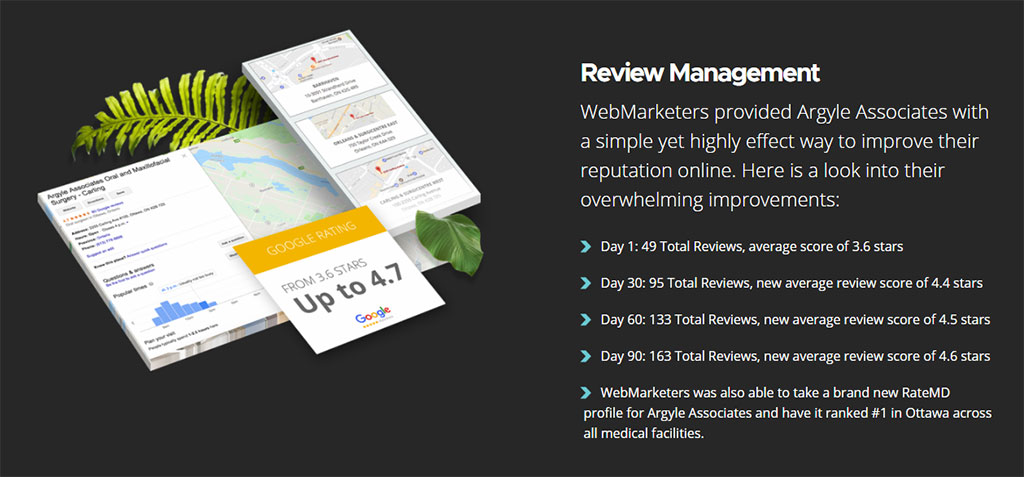
Encourage all your clients to leave public reviews for your agency on sites like Clutch.co or Digital Agency Network. Even a simple Google Review is useful too. All these actions help derisk the decision for a potential client.
Pro Tip: Build processes for capturing client feedback
Every agency should be brainstorming ways to capture more client feedback in all different formats whether this be star ratings, single-line quotes, written testimonials or video reviews. Adding client feedback into case studies showing how you've achieved business objectives provides a great reason to engage for any prospective client.
Download the SEO Proposal PDF
If you haven't already, make sure to download our SEO Proposal PDF. While it's nice to think you can use one template over and over for client proposals, the reality is you'll need to modify and augment each proposal to fit the client needs and expectations. But sticking to a structure of providing value upfront with the SEO audit, then roadmapping all the pieces of work will help set you up for success.
If you can maintain the client's interest up until this point you can win them over with the subsequent sections explaining your agency's methodology, the key people and your case studies.
We hope this SEO Proposal Template is useful to you, please let us know your feedback! Tweet to us @seoptimer.
